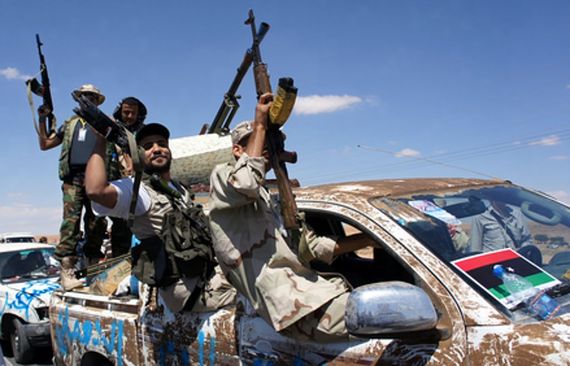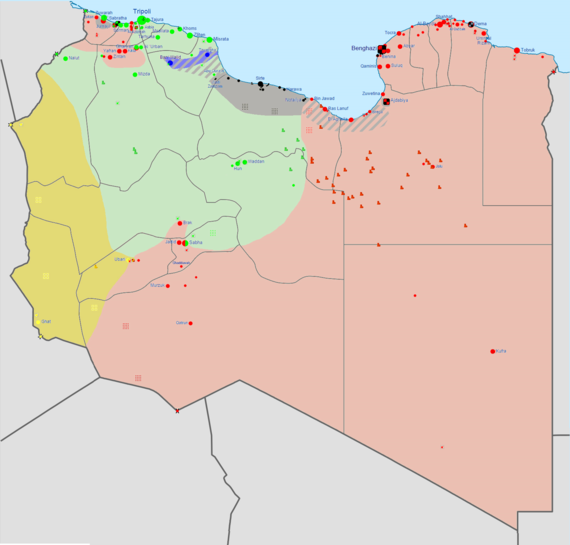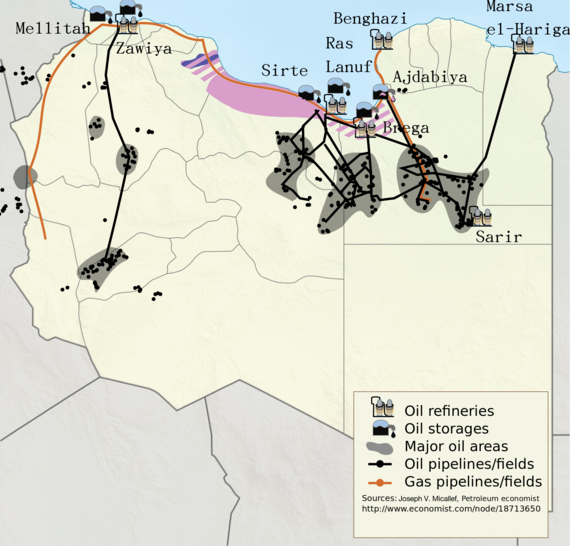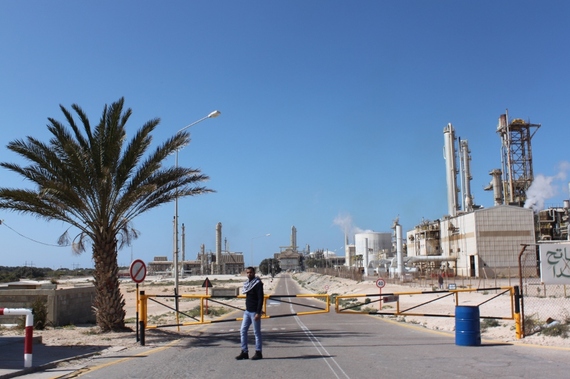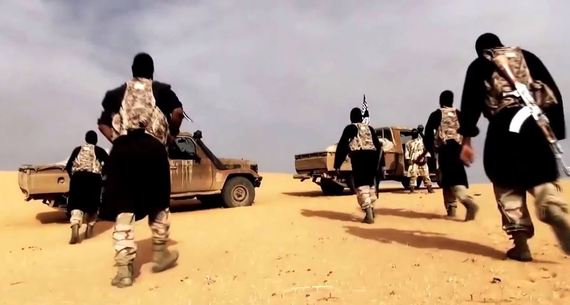The Islamic State has established a solid foothold in Libya and is attempting to expand the territory it controls to include key Libyan oil assets. In recent months Islamic State has dispatched hundreds of jihadist militants from IS controlled territory in Iraq and Syria in an effort to build up its strength in Libya. Currently, IS controls a 150 wide swath of territory along the Mediterranean coast of central Libya with the city of Sirte as its headquarters. On December 11, it claimed to have seized control of the ancient Roman ruins at Sabratha, 30 miles to the west of the Libyan capital of Tripoli.
In addition, it is contesting a broad swath of territory--from Misrata in the west to Ajdabiya in the east. In particular, the zone between Sirte and Ajdabiya contains a significant portion of Libya's oil production and export facilities. The situation remains extremely fluid, however, and it is difficult to determine what zones are directly under the control of the Islamic State in Libya and which are being contested. Most of Libya is empty desert. The bulk of the population lives along a narrow costal strip and a handful of cities.
Libya has always figured prominently in the Islamic State's expansion plans. The first three foreign provinces of Islamic State were all in Libya. On November 13, 2014, Abu Bakr al-Baghdadi announced the creation of three new Islamic State wilayats, or provinces, in Libya (Wilayat al-Barqah, Wilayat al-Tarabulus and Wilayat al-Fizan). The three wilayats corresponded to the three historic regions of Libya (Tripolitania, Cyrenaica and Fezzan). In recent weeks there have been indications that the Libyan city of Sirte would become the new capital of the Islamic State should Raqqa fall to anti-Islamic State forces. There have even been a spate of unconfirmed reports that Islamic State leader al-Baghdadi has abandoned Raqqa and is now in Sirte.
In response to the Islamic State's growing presence in Libya, the United Nations has been sponsoring talks between the country's two rival governments, the Tripoli based House of Representatives and the Tobruk based General National Congress, in an effort to create a "unity government." These talks have been supported by the United States and the European Union in the expectation that a Libyan national government would be better able to request security assistance to deal with the threat posed by the Islamic State. On December 18, representatives of the two governments signed an agreement to end their rivalry and forge a unity government.
It is unclear, at this point, just how widespread the support for the unity government is among members of the two current rival administrations. The speakers of the opposing legislative assemblies both denounced the agreement and declared they would negotiate their own agreements independent of UN sponsorship. The two governments were each represented by the deputy speakers of the two assemblies. Less than 100 members of the 200 members of the rival parliamentary assemblies declared their support for the agreement.
Moreover, it is unclear to what extent the other jihadist groups will support the new government. The allegiance of the various jihadist groups is extremely fluid, with various organizations coming together into a constantly changing kaleidoscope of broad coalitions. The Libya Shield groups, for example, are led by militants with many longstanding ties to al-Qaeda, and have been branded as terrorist groups by the Tripoli based House of Representatives. They have also been praised for their charitable work and, at times, have been supportive of the Tobruk government.
Libyan oil fields and facilities in zones controlled (purple)) and contested (striped) by Islamic State
The same is true of the members of the Libyan Dawn coalition in western Libya. They have been supportive of the government in Tripoli and have often clashed with Islamic State militants. The Misrata Brigades and the Shura Council of Benghazi Revolutionaries, both of which are significant militia groups, are independent of the two Libyan governments and have rejected their authority, but have, on occasion, cooperated with them. Both groups include elements of the Libya Shield groups and, in the case of the Misrata Brigades, are synonymous with them. Ansar al-Sharia, the group responsible for the attack on the U.S. consulate in Benghazi, has also both clashed and cooperated with Islamic State. Lately, they have been loosing a lot of militants to better paying offers for IS.
The Islamic State's strategy in Libya is following the same playbook that it followed in Syria in 2012. Initially, IS sent militants to establish a presence in the chaos of post Qaddafi Libya but did not attempt to direct the operations there to any great degree. As the group gained strength, Islamic State dispatched more jihadists to increase its presence there. Libyans were the largest contingent of foreign jihadists that fought for the Islamic State in Syria and Iraq, so finding militants familiar with Libya wasn't difficult.
In the meantime, in another tactic from its Syrian playbook, IS attempted to recruit jihadists from rival organizations by offering them better salaries. Simultaneously, just as it did in Syria and then Iraq, Islamic State sought to gain control of financial assets that would allow it to better finance its operations and the higher salaries it offers to jihadist recruits.
At the moment, Western intelligence agencies estimate that Islamic State has between 2,000 and 3,000 militants in Libya, the majority of which are not Libyan natives. This number can swell quickly, however, as Islamic State's position improves and, especially, if it can improve its finances by taking control of additional Libyan oil fields. Since 2011, Libyan oil production has declined from around 1.5 million barrels per day of petroleum (BOPD) to around 350,000 to 400,000. It is estimated that Islamic State already controls about 10% of Libya's oil production. Currently, Islamic State is earning between 20 million and 25 million dollars a month from its Libyan oil.
The creation of a new Islamic State in Libya poses significant challenges to the current leadership of the jihadist organization, but also offers some significant opportunities. There are a broad array of other jihadist groups already in Libya that are fighting against Islamic State. Al Qaeda has a strong position in the country and can be expected to resist any further expansion by Islamic State.
In June, an al Qaeda linked jihadist group, the Libyan Islamic Fighting Group, operating under The Mujahideen Shura Council of Derna, declared jihad against Islamic State after IS militants assassinated Nasser al-Aker, the leader of the Abu Salim Martyrs Brigade. Within the month, Islamic State militants had been expelled from the city. On the other hand, Islamic State had considerable Islamist opponents in Syria too, including, its progeny, the al Qaeda backed al-Nusra Front.
Moreover, Britain and France have already signaled their willingness to expand the war against Islamic State to Libya. France has moved 3,500 troops to a new base just 45 miles from the southern border with Libya for counterinsurgency operations, and the British government has announced that it is prepared to deploy a force of 1,000 special forces personnel to assist the Libyan government in counterinsurgency operations.
Both governments have also indicated their willingness to expand air operations to Libya in order to assist the new Libyan unity government. In addition, there are reports out of Rome that the Italian government is preparing a new 5,000 man intervention force to deploy in Libya consisting of military and special forces units drawn from Italy, France, Germany and Great Britain. The force would assist the Libyan government in stabilizing Libya, but officially would not have a "combat role."
On the other hand, Northern Africa offers considerable opportunities to Islamic State. In Iraq and Syria the Islamic State is, by and large, surrounded by areas that are either predominantly Shiite, in which IS has little appeal (Lebanon, Eastern Iraq, Iran), or governments with relatively strong militaries (Turkey, Iraqi Kurdistan, Jordan, Israel). In North Africa, only Egypt and Algeria can field strong military forces. Nigeria, far to the southwest, also has a considerable military force. All three countries, however, are already engaged in their own conflicts with Islamic State linked jihadist organizations. Moreover, there is no significant Shiite community in Northern Africa. In addition, Libya is surrounded by relatively weak governments, especially in the Sub-Saharan Sahel region. The zone, from Somalia to Nigeria to the Mediterranean coast, is already a hot bed of jihadist activity. An Islamic State in Libya could draw a broad number of jihadist groups across northern Africa into its orbit and destabilize governments across the region. Islamic State leader al-Baghdadi has declared that a democratic Tunisia is incompatible with Sharia law and had vowed to overthrow the government there. Tunisia has already been the scene of two horrific Islamic State inspired attacks against tourist venues there and has seen a sharp drop-off in its tourism industry as a result.
An Islamic State in North Africa, just opposite Europe's Mediterranean shore, would further aggravate Europe's refugee crisis. In addition, the prospect of IS inspired violence against the trillion dollar Mediterranean tourism industry could have far reaching economic consequences for a number of Mediterranean countries that rely heavily on that industry. The added revenues that Islamic State would derive from the control of all or a significant portion of the Libyan oil industry, would further increase its capabilities and transform it into a billion dollar plus terrorist organization.
In short, Islamic State is attempting to create, across North Africa in general and in Libya in particular, the same type of hybrid political-terrorist state that it created in Iraq and Syria. While such a task will not be easy, the consequences of its success would represent a major security threat to Europe and especially to those European countries in and along the Mediterranean fringe. Far from being contained, the war with the Islamic State is about to expand into a new battlefield on a whole new continent.

